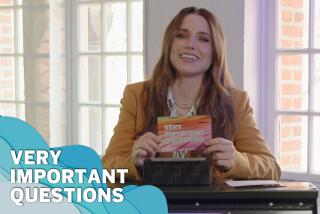Wiping tears, chasing skirts
Normally, you wouldn’t risk being late to your wife’s funeral. If you’re Harry Rent, though, visions of romance with the alluring waitress at Cafe Retro trump conventional notions of punctuality.
Harry has a few other troubles too. Because of a slight by his now-dead wife, Anna, he spends wildly on Eastern European hookers, and he’s been snagged by the police. His work as a radiologist suffers because of a lethargic secretary, Nicole, whom he can’t bring himself to fire. Anna died during cosmetic surgery that she undertook because of his philandering.
Despondent, Harry turns to Edmond Dantes, the swashbuckling hero of “The Count of Monte Cristo.”
We’ve seen Harry before in any number of novels in which a self-loathing, indecisive, middle-aged man tries to negotiate the wreckage he’s caused. As “Harry, Revised,” Mark Sarvas’ first novel, opens, we find the character emotionally stunted, socially maladroit and professionally unmoored.
So he does what comes not so naturally: Harry throws himself into the pursuit of Molly, a lithe, 22-year-old grad student who waits tables. Only Harry uses Molly’s co-worker, a barge of a woman named Lucille, as his entree.
He becomes Lucille’s benefactor, paying her overdue bills and helping her find a new apartment. Harry believes that his largess toward Lucille will, inevitably, lead Molly to him. While this strand of the story plays forward, Sarvas also leads us back through Harry’s history with Anna.
Unfortunately, the novel, like Harry, can’t quite decide what it wants to be.
On a certain level, “Harry, Revised” presents a plausible, if somewhat sentimental, examination of how one can forge a new life from a crucible of self-recrimination and grief.
Simultaneously, Sarvas presents scene after scene of set gags: Harry’s paid-for trysts breed nothing but guilt and a couple of visits from the cops; his Jaguar loses its trunk; Harry takes one to the privates after falling off a stationary bike.
Sarvas seems most at ease when armed with a contemporary skewer. At one point, Anna, not pleased with Harry’s growing paunch, encourages him to join her at a spinning class.
“He can’t help but fasten first on Excessive Head Motion Lady about two rows behind him,” Sarvas writes, “wearing dark sunglasses inside and dramatically flipping her blond ponytail from side to side -- if anyone in this room wants to be looked at as much as Harry wants to be ignored, it’s this woman.”
Sarvas knows when to twist the satirical stiletto, but his narrative too often languishes, falling into situations that, while at times funny and occasionally even touching, leave us wondering why a writer with so much talent can’t quite make the story work.
Part of the problem rests squarely with the supporting characters, whose thinness can’t buttress the novel’s weightier concerns. We know plenty about these players, but they exist only as types.
For all the grad-school lit chic of Molly, she’s got a slimy biker boyfriend she can’t seem to shake. Lucille’s gruff and corpulent exterior hides a soft, lonely side as she wrestles with her feelings toward an ungrateful son long lost to the juvenile court system.
Anna, meanwhile, remains as distant and chilly as the sleek metallic furniture of the couple’s Bel-Air mansion -- a point Sarvas makes repeatedly. This cast provides plenty of opportunities for humor, but the story arcs remain trapped in the amber of predictable patterns.
Sarvas too puts an inordinate amount of symbolic heft onto Harry’s obsession with Dumas; even the sandwich Harry gets (but doesn’t want) at Cafe Retro is a Monte Cristo. Other motifs -- a Swiss Army knife, cycling -- get stretched to unconvincing lengths, and in a turn too jejune, Anna reads “Madame Bovary” on the veranda.
Despite these shortcomings, Harry’s ability to lose himself in his own outrageous thoughts and his slow turn toward confidence come across with heart.
Yes, Harry’s a major league dolt, but, to Sarvas’ credit, we end up pulling for him.
Mark Luce lives in Kansas City, Mo., where he teaches literature at the Barstow School and the University of Kansas.
More to Read
Sign up for our Book Club newsletter
Get the latest news, events and more from the Los Angeles Times Book Club, and help us get L.A. reading and talking.
You may occasionally receive promotional content from the Los Angeles Times.






